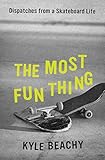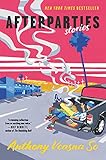People From My Neighborhood by Hiromi Kawakami
“What we had thought was a child was actually a large bird. It had five fingers instead of talons, though, and a somewhat human face. “Scram!” Kanae screamed.” Welcome to the world of Hiromi Kawakami’s People From My Neighborhood. When I was growing up in southern California, smog alerts negated recess frequently in the late ’90s, but never had I needed to run to a forest and grab hold of a tree when a no-gravity alert, like in Kawakami’s story “Weightlessness,” sends school kids in a frenzy, while the more experienced swing effortlessly between the floating vines. Just released in November by the inimitable Soft Skull Press, these surreal stories detail the characters of a neighborhood playfully depicted with Lego characters on the cover. Appropriate considering how effortlessly Kawakami jumps into ridiculous local fables, with characters crossing over and across (and sometimes floating) between these micro-worlds of possibility, humor, and madness. The brevity of the prose, translated by Ted Goossen, forces you to submit to the possibility of Kawakami’s stories that are perfect coffee-break-length escapes from (or comparisons to) our every day.
The Most Fun Thing by Kyle Beachy
 What I most admire about Kyle Beachy’s writing is his ability to travel down an idea, down the rabbit hole, and examine this most fun thing called skateboarding and the many ways it impacts his life. He writes, “I am suggesting, I guess, that whatever skateboarding is or might become depends on the way we speak of it.” From relationships, marriage, academia, creative pursuits, shelved projects, and the ability to kickflip with style, Beachy talks about skateboarding, yes, but everything else that relationship engenders; skateboarding as an instrument, a tool, a compass, an atlas, with blanks to fill in with your own life. In “On Narrative,” Beachy describes how writing about skateboarding is an act of reclamation: “One way to define a poem might be: a poem is the opposite of a brand. One reason to write them might be: to affirm authorship as the province of human beings.” Scenes of domestic bliss clash with the work to get to those moments. Describing a road trip with his wife, “On long drives like that, the car can become a sort of world with its own rules and expectations independent of the extant reality it speeds through.” So too is skateboarding a vehicle for one’s life, and Beachy’s examination of this wooden toy turned Olympic sport is truly the new barometer by which writing about the “thing” should be judged.
What I most admire about Kyle Beachy’s writing is his ability to travel down an idea, down the rabbit hole, and examine this most fun thing called skateboarding and the many ways it impacts his life. He writes, “I am suggesting, I guess, that whatever skateboarding is or might become depends on the way we speak of it.” From relationships, marriage, academia, creative pursuits, shelved projects, and the ability to kickflip with style, Beachy talks about skateboarding, yes, but everything else that relationship engenders; skateboarding as an instrument, a tool, a compass, an atlas, with blanks to fill in with your own life. In “On Narrative,” Beachy describes how writing about skateboarding is an act of reclamation: “One way to define a poem might be: a poem is the opposite of a brand. One reason to write them might be: to affirm authorship as the province of human beings.” Scenes of domestic bliss clash with the work to get to those moments. Describing a road trip with his wife, “On long drives like that, the car can become a sort of world with its own rules and expectations independent of the extant reality it speeds through.” So too is skateboarding a vehicle for one’s life, and Beachy’s examination of this wooden toy turned Olympic sport is truly the new barometer by which writing about the “thing” should be judged.
Afterparties by Anthony Veasna So
 Simply put, these are the stories I wish I read growing up in California. Behind every seemingly whatever shopping complex, mechanic shop, donut shop are those immigrant experiences, stories, and journeys underlying a hyphenated America few read—or get to write—in literature. In “The Shop” a group of older kids corner the protagonist at a Cambodian New Year party. “They interrogated me about whether I had communists for relatives…when I ran back to Dad, sobbing and heaving, he denied any Communist connections to our bloodline but confirmed our history—how half of everyone’s relatives had died.” These are stories taking place in southeast Asian immigrant communities across California’s Central and San Joaquin Valley—former badminton greats bound to inherited bottom-feeder grocery stores, men hooking up in the Delta, the veiled line between day care and child labor, and coming of age on one’s own terms in the wake of generations escaping military dictatorships inconceivable for succeeding generations. “Superking Son Scores Again,” winner of the Joyce Carol Oates Award in Fiction, really showcases So’s strength to weave family narratives, place, and this individual desire to be something greater than their situation here, in our golden state.
Simply put, these are the stories I wish I read growing up in California. Behind every seemingly whatever shopping complex, mechanic shop, donut shop are those immigrant experiences, stories, and journeys underlying a hyphenated America few read—or get to write—in literature. In “The Shop” a group of older kids corner the protagonist at a Cambodian New Year party. “They interrogated me about whether I had communists for relatives…when I ran back to Dad, sobbing and heaving, he denied any Communist connections to our bloodline but confirmed our history—how half of everyone’s relatives had died.” These are stories taking place in southeast Asian immigrant communities across California’s Central and San Joaquin Valley—former badminton greats bound to inherited bottom-feeder grocery stores, men hooking up in the Delta, the veiled line between day care and child labor, and coming of age on one’s own terms in the wake of generations escaping military dictatorships inconceivable for succeeding generations. “Superking Son Scores Again,” winner of the Joyce Carol Oates Award in Fiction, really showcases So’s strength to weave family narratives, place, and this individual desire to be something greater than their situation here, in our golden state.
If you like Afterparties, I also highly recommend Jaime Cortez’s Gordo—an extremely funny, tightly spun, and poignant look at growing up in a 1970s farm labor camp in Watsonville, Calif. Speaking of California, it was fun reading Eve Babitz’s Slow Days, Fast Company, and I also enjoyed, unsurprisingly, Hanif Abdurraquib’s The Little Devil in America. I also picked away at Kim Addonizio’s In the Box Called Pleasure, a nice re-read originally published in 1999 that reminds me of that particular era of San Francisco writers that influenced me greatly.
The Trees by Percival Everett
 I am a very big fan of Percival Everett’s writing and I’m frequently left with more questions than answers about life, identity, greed, purpose, and even horses at the end of an Everett novel. The plots of Everett’s novels are nuts—babies are talking geniuses; bodies disappear from crime scenes only to reappear as religious sacrifices; intentionally stereotypical written novels interrupt actual novels—and in the case of The Trees, the specter of Emmett Till’s lynched corpse is implicated in a series of murders in “crooked letter” Money, Miss. As the case expands and more characters from law enforcement and Money emerge, Everett weaves paranoia and possibility together between the chasm of Jim Crow connecting Reconstruction and the Civil Rights movement. Diehard fans will notice a marked emphasis on character dialogue-heavy chapters, a departure from whatever traditional style Everett entertains. Yet again I am left analyzing the last page of an Everett novel, trying to find myself between the reaction of the characters in the final scene, the legacies of lynching they are all navigating and how every reaction as to how to handle this history cannot exclude violence. One of his most compelling novels to date, and for the neophytes, a great entry point into Everett’s catalogue.
I am a very big fan of Percival Everett’s writing and I’m frequently left with more questions than answers about life, identity, greed, purpose, and even horses at the end of an Everett novel. The plots of Everett’s novels are nuts—babies are talking geniuses; bodies disappear from crime scenes only to reappear as religious sacrifices; intentionally stereotypical written novels interrupt actual novels—and in the case of The Trees, the specter of Emmett Till’s lynched corpse is implicated in a series of murders in “crooked letter” Money, Miss. As the case expands and more characters from law enforcement and Money emerge, Everett weaves paranoia and possibility together between the chasm of Jim Crow connecting Reconstruction and the Civil Rights movement. Diehard fans will notice a marked emphasis on character dialogue-heavy chapters, a departure from whatever traditional style Everett entertains. Yet again I am left analyzing the last page of an Everett novel, trying to find myself between the reaction of the characters in the final scene, the legacies of lynching they are all navigating and how every reaction as to how to handle this history cannot exclude violence. One of his most compelling novels to date, and for the neophytes, a great entry point into Everett’s catalogue.
More from A Year in Reading 2021 (opens in a new tab)
Don’t miss: A Year in Reading 2020, 2019, 2018, 2017, 2016, 2015, 2014, 2013, 2012, 2011, 2010, 2009, 2008, 2007, 2006, 2005










